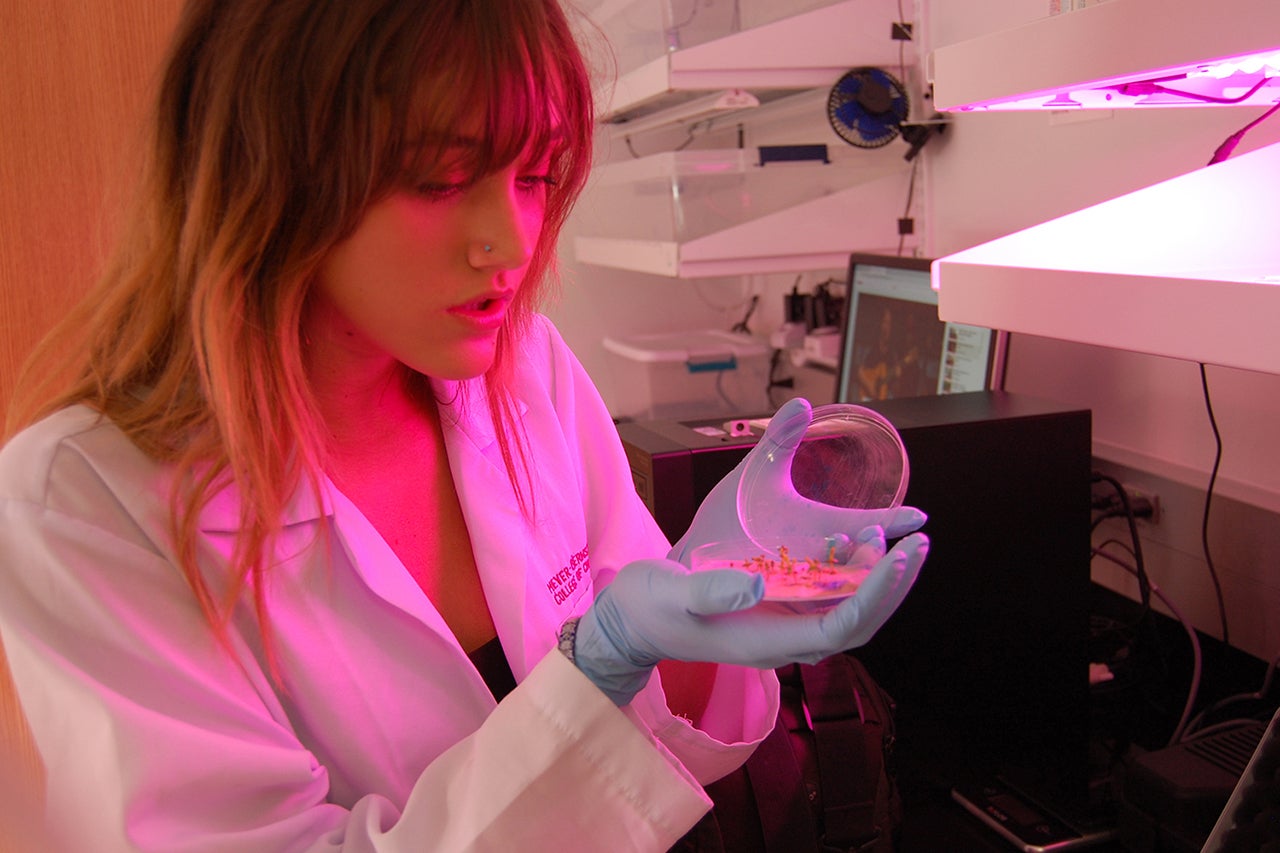Everything is different in a world with COVID-19. Socializing. Working. Even shopping is different. And life as an undergraduate has been different as well. But that isn’t keeping students at the College of Charleston from gaining valuable experience with hands-on research this summer.
Each year, the College’s Office of Undergraduate Research and Creative Activities funds a collection of student-faculty research projects as part of its Summer Undergraduate Research with Faculty (SURF) grant program. These projects represent a wide array of academic disciplines from the hard sciences to the social sciences to business, the arts, languages and humanities. To fund these projects, student-recipients can obtain grants of up to $6,500.
This summer, more than 25 students are working closely with faculty mentors as SURF grant recipients. According to biology professor Elizabeth Meyer-Bernstein, who has managed the SURF grant program for the past four years, this is vital experience for these students.
“Experiential learning is directly linked to student success,” Meyer-Bernstein explains. “And due to the depth of engagement that can be achieved during a full-time, summer, immersive experience, SURF grants are particularly important for our students. Discontinuing this program because of COVID-19 wasn’t an option. Too many of our undergraduates rely on these experiences to deepen their knowledge and develop skills that make them competitive for post-graduate pursuits.”
Once it became clear that it wouldn’t be “business as usual” this summer, Meyer-Bernstein says she contacted faculty mentors to develop new approaches so that the research program could continue.
“They very quickly pivoted and redesigned their projects so that the students could work virtually until campus re-opens,” she says. “They did all this while in the midst of moving their own courses online. As the director of this program, I was absolutely amazed at the creativity and the commitment the faculty mentors demonstrated while we were all trying to navigate the early news reports concerning COVID-19. Students on our campus are so fortunate to have access to such innovative and caring faculty members who truly put the students’ needs above their own.”
Here’s a look at six SURF projects students are working on this summer.
Mapping the Flood
Rising sophomore Connor Cozad is working to develop a mobile app that can alert users about flooding in specific areas of Charleston. He’s conducting this work alongside geology professor Norm Levine (and a cadre of graduate students from the University of Charleston, S.C.). As a computer science major, Cozad will be designing and testing algorithms for collecting the tidal information provided by the National Oceanic and Atmospheric Administration. He and the graduate students will use that data to create maps of tidal flooding on streets in real time and in predictive modes. This project combines the resources of the College’s Lowcountry Hazards Center and its Santee Cooper Geographic Information Systems Laboratory.
New Food Sources from Saltwater
Another rising sophomore, biology major Sophia Bernstein, is working with professor Daniel McGlinn to explore a novel approach to growing food – seawater agriculture. This duo is researching the impact of light duration and pruning on Salicornia europaea (also known as glasswort or sea beans) in a hydroponic setting. Bernstein says that she’s testing whether those strategies will influence plant yield and palatability for human consumption. “This project will help to uncover the potential of Salicornia to provide a healthy and sustainable agricultural commodity in this time of rapid environmental change,” she says.
The Use and Abuse of Philosophy
Philosophy major Patrick Wohlscheid is working with professor Jonathan Neufeld to delve into the history of a former professor. James Warley Miles taught at the College in the mid-19th century. He was an Episcopal clergyman and a philosopher who used German Idealist arguments in his discussions of theology and humanity’s place in history, and developed a defense of slavery in the U.S. Wohlscheid and Neufeld will rigorously examine Miles’ surviving texts in order to better understand the theories that Miles dishonestly interpreted to advance the cause of racial subjugation.
Tracing Light’s Journey Through Clouds
Chris Blouin is something of a serial researcher. As a double major in economics and physics, he’s received research funding from the College for several different projects. This summer, the rising senior is working with physics professor Michael Larsen to examine how sunlight travels through clouds. “Suspended cloud droplets can gather in clusters and understanding what effect this clustering has on light transmission is important in understanding atmospheric processes driven by light,” Blouin explains. “That could lead to further understanding of related phenomena such as the influence that human activity has had on the Earth’s climate.”
The Impact of Overdose
Rising senior Duncan Weller is getting some valuable experience this summer. He is adding his interest in the impact of overdose to the work of two faculty members. With assistance and guidance from professors Christy Kollath-Cattano (health and human performance) and Sarah Hatteberg (anthropology and sociology), Weller, a public health major with plans to attend medical school, is examining how undergraduates are impacted by experiencing an overdose. He says that his project will also provide data regarding the relationship between overdose and mental health outcomes, such as depression and anxiety.
A New Approach to Micropollutants
Fabio Najjar is a biochemistry major. This summer, he’s working with professor Kate Mullaugh to explore a new way of removing micropollutants from wastewater. Najjar says he’s hoping his research leads to a new, more efficient, more economical and more environmentally friendly way of treating wastewater so that it’s free of micropollutants.










